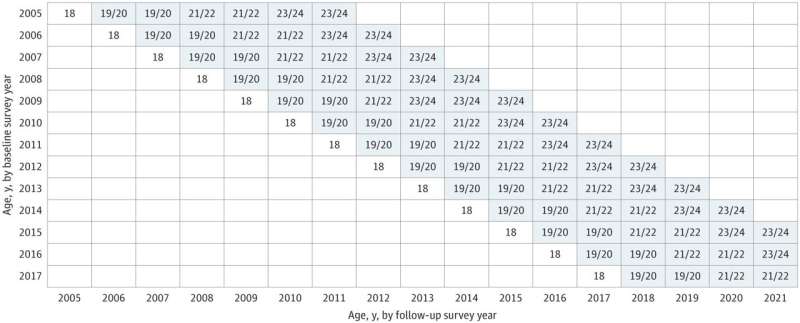Study Design. Credit: JAMA Network Open (2023). DOI: 10.1001/jamanetworkopen.2023.22650
Many parents whose kids take prescription stimulants like Ritalin to treat ADHD worry that it could lead to illicit drug use later.
A University of Michigan study appearing in JAMA Network Open found that that's not the case. Researchers report that high school seniors who used stimulant therapy are no more likely to use cocaine or methamphetamine as young adults (ages 19-24) than peers who did not use stimulant therapy to treat ADHD as teenagers.
"These findings should be comforting to parents who have teenagers taking stimulants for ADHD, who worry that these medications may lead to use of illicit stimulants like cocaine or methamphetamine as their children enter young adulthood and become more independent," said lead researcher Sean Esteban McCabe, U-M professor of nursing and director of the Center for the Study of Drugs, Alcohol, Smoking and Health.
However, the study also found that teens who misuse prescription stimulants are significantly more likely to use cocaine or methamphetamine as young adults––and the frequency of misuse matters:
- 20% of teens who misused prescription stimulants during high school started using cocaine or methamphetamine in young adulthood
- 34% of teens who misused prescription stimulants 10 or more times used cocaine or methamphetamine as young adults
Taken together, the findings reinforce the importance of risk-reduction strategies such as monitoring and safely storing stimulant medications, as well as screening adolescents for drug use, including using prescription stimulants on their own, McCabe said.
The study is important, he said, because prescriptions for stimulant medications have greatly increased in the last two decades.
Prescription stimulants are the most commonly misused controlled substance among teens and young adults. Stimulant-related overdose deaths have increased tenfold in the past decade, according to data from the Centers for Disease Control and Prevention.
"Those overdose deaths are driven primarily by illicit stimulants such as cocaine and methamphetamine, calling into question the role that prescription stimulants might play in the initiation of illicit stimulants," McCabe said. "We were interested in studying this association so we can identify and address drug use before major problems develop."
Prior research has shown that ADHD is associated with an increased risk for illicit drug use, so the fact that researchers didn't see an increased risk in teens who used stimulant therapy to treat their ADHD was encouraging.
Researchers used data from more than 5,000 high school seniors between 2005-2017 from U-M's Monitoring the Future study, and followed these teens into young adulthood between 2011-2021.
More information: Sean Esteban McCabe et al, Cocaine or Methamphetamine Use During Young Adulthood Following Stimulant Use for Attention-Deficit/Hyperactivity Disorder During Adolescence, JAMA Network Open (2023). DOI: 10.1001/jamanetworkopen.2023.22650
Journal information: JAMA Network Open
Provided by University of Michigan























